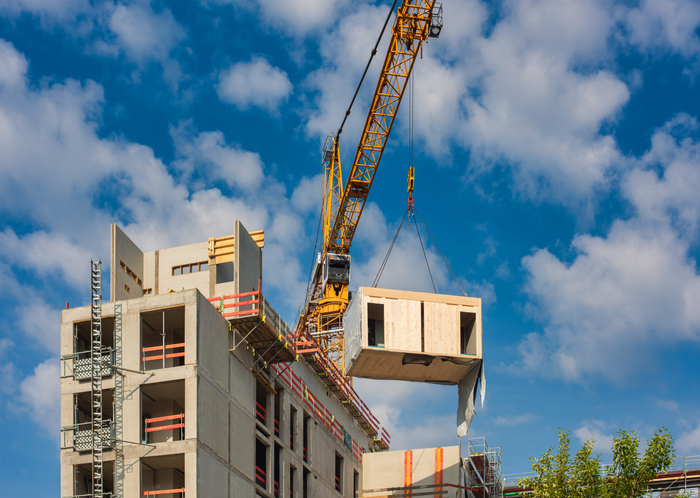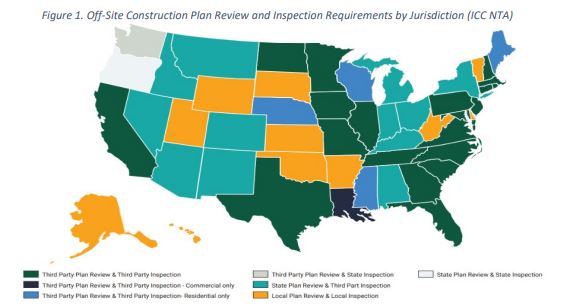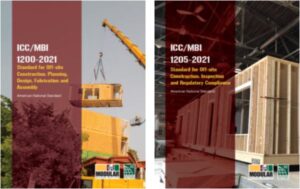
Off-Site Construction Solutions Highlighted at Senate Hearing on Housing Supply and Innovation
With national housing costs having risen 52 percent from 2017 to 2022, off-site construction offers an affordable solution.
Earlier this fall, the Senate Banking Subcommittee on Housing, Transportation, and Community Development held a hearing on “Housing Supply and Innovation,” which included discussions on modular homes.
Off-site (modular) construction, or pre-fabrication, is the design and delivery of housing using an industrialized and manufactured-style approach. With national housing costs having risen 52 percent from 2017 to 2022, this method of construction offers an affordable solution, capable of curbing construction timelines and reducing costs. Off-site construction can deliver projects 20 to 50 percent faster than traditional site-built methods, while also providing cost savings of up to 20 percent.

Off-Site Construction Delivers More Affordable and Accessible Housing at Scale
The shortage of affordable homes and rentals was at the forefront of the discussion at the hearing. Chairwoman Tina Smith (D-MN) stressed that there is a shortage of 7.3 million rental homes and simultaneously emphasized that a quarter of homeowners, nationally, are spending a larger share of their income on housing costs.
Ranking Member Lummis (R-WY) reiterated that high prices and high mortgage rates have priced people and families out of homeownership, emphasizing that companies cannot expand into certain areas because their staff cannot afford to rent/buy in those areas.
After opening statements, the Senators welcomed panel testimony which included Mr. Schaefer from Fading West, who advocated for modular homes, citing material, time and cost savings.
Mr. Schaefer explained that a new home can be completed in 40 days or less, versus over nine months for stick style construction, and that construction costs are 20 percent lower. He touched on the complexity of Colorado’s home rule adoption of the codes and added that there is a slowdown with over 300+ regulations at the state and local levels. He supported greater harmonization of regional building codes to streamline the housing construction regulatory process.
Addressing Regulatory Inconsistencies in Off-Site Construction
While modular construction is more affordable than traditional methods, the off-site construction movement faces some obstacles in the United States, including a lack of consistent building standards.
Currently, as displayed in Figure 1, 39 states and Washington, D.C. regulate off-site construction. These programs are responsible for plan review and inspection of off-site construction components. However, these programs vary significantly state by state – some allow third-party agencies to conduct both plan review and factory inspections, while others only allow state employees to do so.

Project scope and components vary too – some regulations are designed just for residential versus commercial, while component guidelines may include closed panels or only allow volumetric modules.
In the remaining 11 states, off-site construction is decided at the local level. These local (town or county) governments may lack the capacity and capability to effectively approve said projects, presenting an obstacle to increasing affordable homes fast. Ultimately, the variation in regulation increases costs for manufacturers and builders, who are operating without the help of standardization.
Chairwoman Smith entered into the hearing testimony submitted by the Code Council. This testimony encouraged the federal government to support ways to address regulatory inconsistencies including the Code Council’s and Modular Building Institute’s (MBI) ICC/MBI Off-site Construction Standard 1200: Planning, Design, Fabrication (“1200”), and Assembly and ICC/MBI Off-site Construction Standard 1205: Inspection and Regulatory Compliance (“1205”), which cover the entire off-site construction process and capture best practices to support a consistent approach to verifying compliance.

The standards apply to all componentized, panelized and modularized elements in both commercial and residential buildings, except U.S. Department of Housing and Urban Development (HUD)-regulated manufactured housing.
- Standard 1200 provides requirements for designers, manufacturers, transporters and assemblers to assure that off-site construction components are produced under a quality assurance/quality control process and that they can demonstrate compliance with building code requirements.
- Standard 1205 addresses the compliance verification process including permitting, in-plant and on-site final inspections, third-party inspections, as well as the role of Industrialized Building Departments, state modular programs and localities.
How to Support Adoption of Off-Site Construction Standard
The Code Council looks forward to the adoption of 1200 and 1205 standards and recommends that HUD and other federal agencies support their adoption through state/local grants and direct technical assistance.
Learn more about Code Council off-site construction solutions, here.







